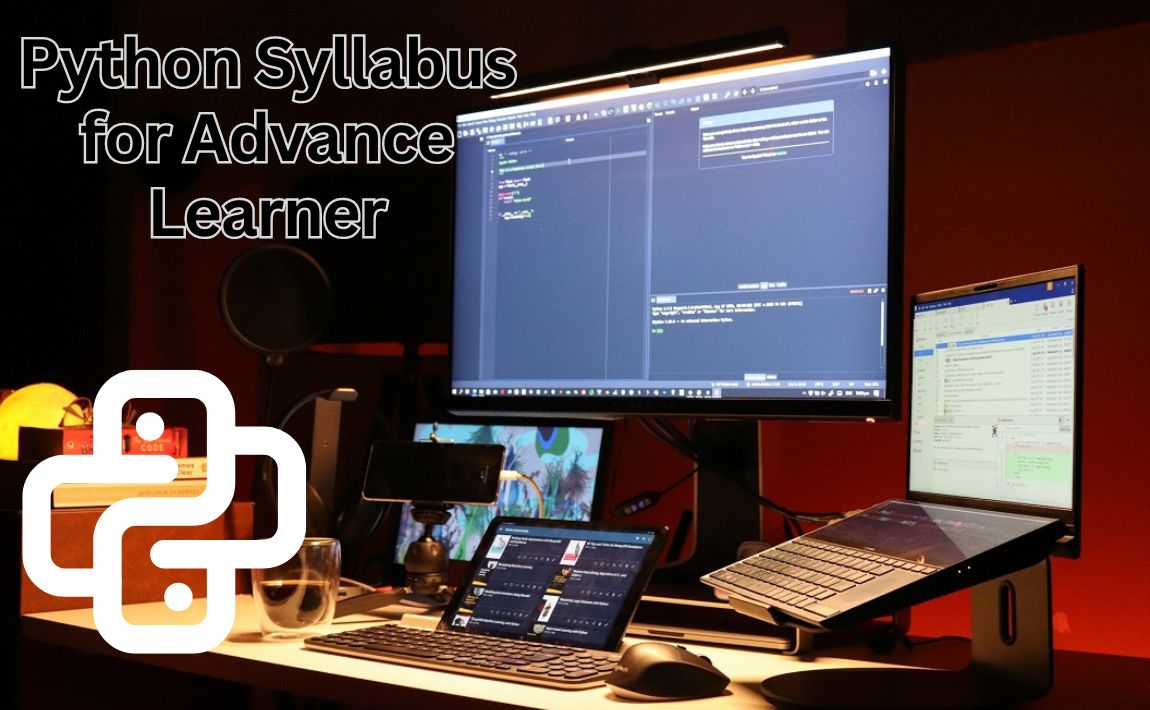The Python syllabus for advanced learners delves into intricate topics, building upon foundational knowledge. It typically includes advanced data structures such as sets, dictionaries, and custom classes, exploring their implementation and optimization. Advanced topics in functional programming, including lambda functions, map, filter, and reduce functions, are covered in depth. Learners explore advanced techniques in handling exceptions and managing resources using context managers. Advanced modules like itertools and functools are introduced for efficient iteration and functional programming paradigms. Threading and multiprocessing concepts are explored for parallelism and concurrency, along with advanced topics in asynchronous programming using async and await syntax. Advanced topics in object-oriented programming are discussed, including inheritance, polymorphism, and class decorators. Additionally, learners delve into advanced topics in Python libraries such as NumPy, pandas, and matplotlib for data manipulation and visualization, as well as advanced topics in web development using frameworks like Flask or Django. The syllabus also often includes elements of software engineering practices such as testing, debugging, and code optimization techniques. Throughout the course, emphasis is placed on practical application through hands-on projects and exercises to solidify understanding and proficiency in advanced Python programming.
| Python Syllabus for Data Science | Python Syllabus for Beginners |
| Oops in Python | Best Syllabus of Maths for Data Science |
Most Advance Python Course for Professionals
For advanced learners, a Python syllabus can delve deeper into complex topics and advanced techniques. Here’s a suggested outline:
Week 1: Advanced Data Structures
- Sets: methods, operations, set comprehensions
- Collections module: defaultdict, Counter, namedtuple
- Heapq and bisect modules for advanced data manipulation
- Exercises on advanced data structures
Week 2: Functional Programming
- Higher-order functions: map, filter, reduce
- Lambda functions and their applications
- List comprehensions vs. generator expressions
- Decorators: creation, usage, and common patterns
- Functional programming examples and exercises
Week 3: Concurrency and Parallelism
- Threading vs. multiprocessing
- Concurrent programming with the threading module
- Multiprocessing with the multiprocessing module
- Asynchronous programming with async/await
- Using concurrent and parallel programming for performance optimization
Week 4: Advanced Object-Oriented Programming
- Advanced class features: properties, class methods, static methods
- Method resolution order (MRO) and multiple inheritance
- Meta-programming: class decorators, metaclasses
- Design patterns: singleton, factory, observer
- Practical examples and exercises on advanced OOP concepts
Week 5: Advanced File Handling and Serialization
- Working with binary files
- Using the pickle module for object serialization
- JSON and YAML serialization formats
- Custom serialization with JSONEncoder and JSONDecoder
- Handling large datasets efficiently
Week 6: Database Integration
- Introduction to database systems and SQL
- Using SQLite with Python
- Working with databases using SQLAlchemy ORM
- Database transactions and concurrency control
- Practice exercises with database integration
Week 7: Web Development with Flask
- Introduction to web development concepts
- Setting up a Flask application
- Routing, request handling, and response rendering
- Templates and Jinja2 for dynamic content
- Integrating databases and RESTful APIs with Flask
Week 8: Web Scraping and Automation
- Introduction to web scraping techniques
- Using BeautifulSoup for HTML parsing
- Scraping dynamic websites with Selenium
- Automation scripts for web tasks and workflows
- Ethical considerations and best practices in web scraping
Week 9: Data Science and Machine Learning
- Introduction to data science libraries: NumPy, Pandas, Matplotlib
- Data preprocessing and exploration with Pandas
- Introduction to machine learning with scikit-learn
- Supervised and unsupervised learning algorithms
- Building and evaluating machine learning models
Week 10: Final Project and Advanced Topics
- Students work on a final project applying advanced Python concepts learned throughout the course
- Project presentation and review
- Exploration of additional advanced topics based on student interest and time constraints, such as network programming, GUI development, or advanced data analysis techniques
This syllabus provides a comprehensive roadmap for advanced learners to deepen their understanding and proficiency in Python, covering a wide range of advanced topics and practical applications.
